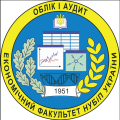Увага! Графік проведення І туру Всеукраїнської олімпіади у 2018 році для студентів напряму підготовки «Облік і аудит» (спеціальності «Облік і оподаткування»)
Проведення І туру Всеукраїнської олімпіади у 2018 році для студентів напряму підготовки «Облік і аудит» (спеціальності «Облік і оподаткування») за наступним розкладом:
|
Курс, група |
Дата проведення |
Час проведен-ня |
Місце проведення |
Відповідальні НПП |
зі спеціальності «Облік і оподаткування»
|
4 курс
|
20 лютого |
2 пара |
ауд. 228 корп. 10 |
д.е.н., проф. Савчук В.К. д.е.н., проф. Калюга Є.В., к.е.н., доц. Тивончук С.В., к.е.н., доц. Кузик Н.П., к.е.н., доц. Шевчук К.В., к.е.н., доц. Шиш А.М. |
|
3 курс, гр. 9 ст |
20 лютого |
4 пара |
ауд. 610 корп. 10 |
|
|
5 курс |
22 лютого |
2 пара |
ауд. 511 корп. 10 |
Управлінський облік
|
4 курс
|
13 лютого |
2 пара |
ауд.228 корп. 10 |
д.е.н., проф. Калюга Є.В., д.е.н., проф. Лазаришина І.Д.., к.е.н., доц. Тивончук С.В., к.е.н., доц Мельянкова Л.В., к.е.н., доц. Шиш А.М. |
|
3 курс, гр. 9 ст |
13 лютого |
4 пара |
ауд. 610 корп. 10 |
|
|
5 курс |
14 лютого |
3 пара |
ауд. 76 корп. 4 |
Організація і методика аудиту
|
5 курс |
21 лютого
|
3 пара |
ауд. 33 корп. 4 |
д.е.н., проф. Калюга Є.В., к.е.н., доц. Кузик Н.П., к.е.н., доц Ганяйло О.М О к.е.н., доц. Шевчук К.В., к.е.н., доц. Шиш А.М. |
